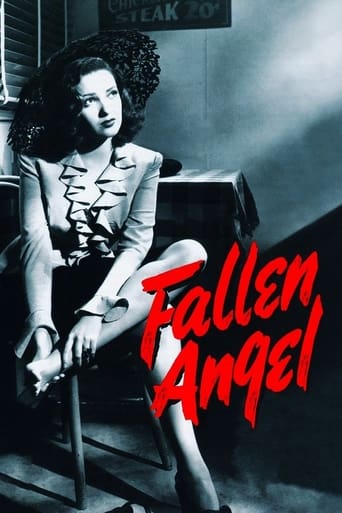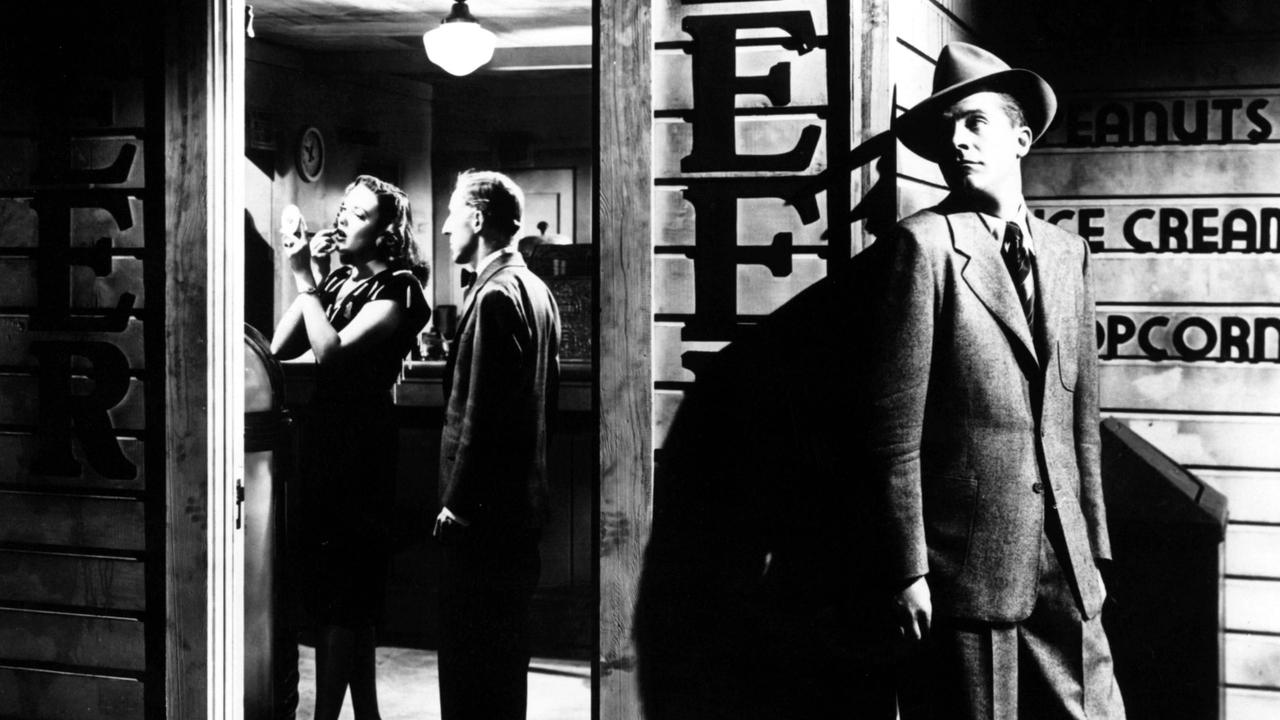SnoopyStyle
Penniless con-man Eric Stanton (Dana Andrews) gets thrown off the bus in the seaside town of Walton between L.A. and San Francisco. He is taken with sultry waitress Stella (Linda Darnell). He joins forces with spiritualist con-men Professor Madley and his assistant Joe Ellis. They have been trying to scam the town in spite of the powerful disbelieving spinster Clara Mills (Anne Revere) and her younger sister June (Alice Faye). The Mills lost their father and Madley pretends to have a public seance to contact the late Mr. Mills. Eric needs money to marry Stella and decides to get it out of June in a quickie marriage. He is terribly jealous of Stella's flirtations with other men.This is a noir directed by Otto Preminger coming a year after Laura. The dialog and performances are hard-boiled. The movie is pulpy goodness. The character June would work better as a young innocent. Alice Faye is playing a spinster and it's hard to see her falling for his simple self-assured flirtations. She has more worldliness than the role seems to suggest. Apparently, she didn't like the movie and left Hollywood for awhile over it. This has many of the trappings of good noir. Perminger's early prowess is on display.
GManfred
"Fallen Angel" is a good, solid example of 'film noir', which should come as no surprise as the director is Otto Preminger, one of Hollywood's foremost directors. He has captured the mood and essence of the genre better than most others who lack his skill and polish. Here he has Dana Andrews as his morally ambiguous hero and Linda Darnell as his female lead. She strikes just the right tone of hardened slutiness, usually exemplified by Clare Trevor or Audrey Totter.The one false note in this picture is the character played by Alice Faye, who plays a goody-two shoes role in which the scales never fall from her eyes. I guess she played the part the way it was written - in most scenes, she wears white and Darnell wears black - and her warm, conciliatory temperament is completely at odds with all other characters in the film. I thought it passing strange that there is an overarching feeling of incivility and edginess to all involved, and, specifically, it defies belief that Faye would stick with Andrews after absorbing his rude, bad-tempered demeanor. In her climactic scene she was unconvincing and lacked the acting skill for such a scene. And she was not helped by the lack of background music, which might have helped her cause.Cutting to the chase, it was an entertaining 98 minutes and was a genuine mystery right up to the end. This is my favorite type picture and I kept my streak going by failing to spot the murderer - I was so sure I guessed it, but, as usual, I was wrong.
robert-temple-1
This is truly a memorable film noir of the immediate post-War period, directed by the grand master, Otto Preminger. The star of the film is the 22 year-old Linda Darnell, as a hard-boiled, free-ranging girl on the make. She has only to raise her eyebrow to make men slobber, she knows it, and she is determined to use it to get 'a home and a ring'. Just as now, there was a problem with men not wanting to commit, so this leads to the noirish complications of this dark tale of passion. The change in Linda Darnell since her debut in films only six years earlier is astonishing. In her first film, HOTEL FOR WOMEN (1939, see my review, which six years later is still the only review of this film on IMDb), Darnell was a wide-eyed innocent and as fresh as a new loaf of bread just out of the oven. But, then, she was at that time only sixteen! It is a great tragedy that this talented actress died at the early age of 41 in a house fire, in 1965, ironically while watching herself on television (surely one of the most bizarre deaths of a movie star ever recorded). Dana Andrews is the languid male lead in this film, but here he is meaner-spirited than usual, showing by his callous and calculating nature that the feelings of others don't come into it. Natch, he falls for the irresistible dame and does unspeakable things in his desperation to have Darnell for himself. But there are other men who have their own ideas. Darnell works in Pop's Diner as a sultry waitress who sometimes shows up for work, sometimes not. Pop is played by Percy Kilbride (1888-1964), an excellent older character actor who is infatuated with Darnell, as everybody else is too, of course. I was somewhat thrown by one discrepancy in this film, however. A big deal is made of Andrews paying five cents for a cup of coffee in Pop's Diner at the beginning of the film, but throughout the film we continually see on the wall a sign saying that a cup of coffee costs ten cents. Come on, continuity!! When people get numbers wrong, I get jumpy. Charles Bickford plays a very cool cucumber, a local police chief who is always in Pop's Diner drinking that ambiguously-priced coffee. He eyes Andrews suspiciously throughout the film, who also spends rather a lot of time at the same diner counter, ogling the same Darnell, and drinking the same coffee. This later turns out to be important, though early in the story it is very down-played by the cunning Preminger. The script has some taut lines, such as Andrews saying 'Don't smile. Your face looks better without it.' But there are not as many wisecracks as one would like, and there is little time for any humour. Alice Faye plays a local 'good gal' who is from a rich family. She is very fetching, and one wonders why only Darnell gets all the attention. She does not sing in this film, although she does play the organ in church ('I was improvising,' she says to Andrews, who thinks she was playing some famous composer). Faye's older sister is well played by Anne Revere, who in this role might as well be called Anne Severe. (IMDb informs me that she was a direct descendant of Paul Revere, the hero of the American Revolution, so I had better show a bit more respect!) Severe is trying to save her little sister from falling into the clutches of Andrews, who wants to marry her for her money while being insanely infatuated by Darnell. Does this remind you of a film noir? Yes! And it goes on from there, getting more and more twisted up in knots of passion, fate, desperation, obsession, lust, you name it. The lighting is superb, so atmospheric, with all those striped effects even when there are no Venetian blinds anywhere to justify them, brooding darkness, but with spots in all the right places, just perfect for the genre. Preminger's direction is flawless. This is one of those velvety-smooth noir classics, there's no doubt about that. And the Fox Noir Series DVD release is made from a perfectly preserved negative, not an old print, so the quality of the images is as crisp as if the film were made only last week.
funkyfry
Otto Preminger and star Dana Andrews made this film a year after their highly acclaimed "Laura", with leading ladies Linda Darnell and Alice Faye (top billed above Darnell and Andrews). As with "Laura", this is a mystery film and fits solidly into the genre of mystery, and not suspense as many have claimed. This is just the first of many misunderstandings in my opinion about the film that stem from genre concerns.Although in a sense it's intriguing, the first thing that limits this film is the seemingly random and even arguably contrived nature of the main character's actions. Eric (Andrews) arrives in town short of bus fare to San Francisco, and manages to involve himself with a sham-mystic (John Carradine) and a pair of young ladies with a small inherited fortune (Faye and Anne Revere as her jealous sister), all as a sidelight to falling in love with sultry barmaid Stella (Darnell). He promises Stella that he can get enough money to marry her and buy her a house, seemingly by marrying June (Faye) and stealing her money from the safe deposit box in SF.Given this scenario, it's extremely hard for the film-makers to twist our sympathies so that they eventually favor all 3 of the principals. First of all, we're supposed to believe that June has some deep, truly meaningful emotional commitment to Eric even though they've only known each other for a week and Eric was busted trying to steal her money and could possibly be a killer. It's the old standard "women's picture" trope about the faithful wife, draw to a truly ridiculous extreme that would make most modern viewers cringe.Then we have Eric, a truly weird guy. Dana Andrews was not the best actor to play this character; he is too much of a static presence to play such a dynamic speaker and personality. It calls for the kind of grace and glib that Tyrone Power showed in "Nightmare Alley" or Glenn Ford in "3:10 to Yuma." It's a little bit hard to believe that Dana Andrews of all people has some kind of preternatural charm.But then there's Darnell, cast as a good girl who bears every distinguishing mark and trait of a very bad girl. She's very sexy in this movie and the dance-hall scenes and beach scenes are perhaps some of the steamiest of the 1940s. However I was surprised so many reviewers here singled her out as a bad girl or a "femme fatale." They must be viewing the film through the context of the so-called "film noir" genre as opposed to the mystery genre which this film is actually a part of. If you take time to really re-construct the story, she is a complete innocent (which, in turn, justifies Eric's "obsession" with her as simply a romantic emotion). It's clear she has a prior relationship of some kind with the sadistic detective Judd (Charles Bickford", who we find out at the conclusion was the killer, motivated by jealousy over Eric and another suitor (Bruce Cabot). Instead of a woman motivated to manipulate all 3 men for money, it becomes easy to see that she was so terrified by Judd's behavior that she made a desperate plea to both Eric and Cabot's character in the hopes that they could rescue her from the psycho-stalker police officer. How so many people can still see her as a "femme fatale" after all the facts are on the table is sort of beyond me, but I suppose it's part of the convoluted and unreal nature of this narrative to begin with.The film is far from a total success but just as far from a total bore. The scenes with Darnell and Andrews are delicious, and the weird asexual stalemate between Faye and Andrews is almost as interesting although somewhat too sincere. There's a wince-inducing scene where they lounge on the beach (Andrews: "Every night could be like this: on the beach, eating hot dogs....") and then the strange aftermath of Stella's death with June's disturbing reaction (she insists she knows he can't be the killer, although she's only known him for a week during which he tried to steal her life's savings). Preminger's excellent direction makes this rather predictable and improbable murder a very enjoyable viewing experience.


 AD
AD



